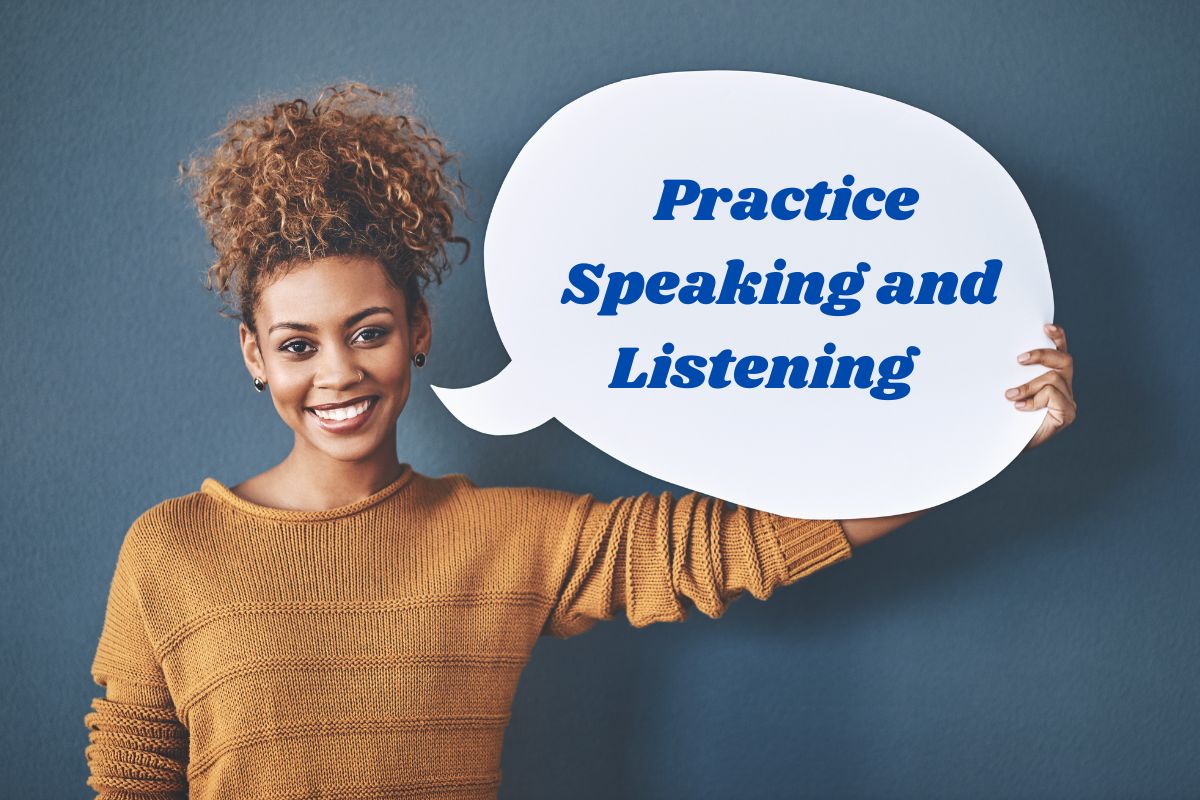Starting to learn English can be an exciting journey, and there are several effective strategies to enhance your experience.
Here are the top 10 tips for learning English, which include practical approaches and modern techniques to boost your language skills.
Embracing these tips will help you build a solid foundation in English and increase your confidence in using the language.
![a infographic for How To Start Learning English: Top 10 Tips [2025]](https://phoenixenglishlang.com/wp-content/uploads/2024/06/unnamed-14.png)
Important Points:
- Set Clear Goals: Identify why you want to learn English. Setting specific, measurable, achievable, relevant, and time-bound (SMART) goals will help guide your studies. For example, aim to be able to hold a conversation in English within six months or understand a specific number of vocabulary words each week.
- Immerse Yourself: Surround yourself with the language through movies, music, podcasts, and books. Immersion helps you develop an ear for the language and exposes you to diverse vocabulary and idiomatic expressions. Try to engage with content that interests you to keep motivation high.
- Practice Speaking: Speaking is a critical skill, so practice as much as possible. Join language exchange groups, attend English-speaking clubs, or engage with friends who speak English. Speaking regularly will help improve your fluency and confidence.
- Utilize Language Learning Apps: Leverage technology by using language learning apps like Duolingo, Babbel, or Rosetta Stone. These apps provide structured lessons and often include gamified elements to make learning more enjoyable and interactive.
- Expand Your Vocabulary: Make it a habit to learn new words daily. Use flashcards, word lists, or vocabulary apps. Focus on words and phrases that are relevant to your life and interests, and try to incorporate them into conversations as soon as possible.
- Study Grammar Basics: While conversational skills are important, understanding grammar is essential for clear communication.
Start with the basics of sentence structure and common verb tenses, then gradually delve into more complex grammar rules. Online resources can provide helpful explanations and exercises.
- Write Regularly: Writing helps reinforce what you’ve learned. Start a journal, write emails, or create short essays and have them reviewed. This practice will improve your writing skills and help with grammar and vocabulary retention.
- Be Patient and Consistent: Language learning is a marathon, not a sprint. Set aside regular time for practice and be patient with your progress. Consistency is key to achieving fluency, so aim for daily or weekly study sessions, even if they’re short.
- Engage with Native Speakers: Whenever possible, interact with native English speakers. This can provide real-life context to your learning and help you understand cultural nuances, slang, and pronunciation. Consider virtual language exchanges or conversation partners.
- Stay Positive and Enjoy the Process: Celebrate small victories and maintain a positive attitude. Learning a language can be challenging, but it should also be enjoyable. Find activities and materials that you love to keep your motivation alive.
As we delve deeper into the topic of “how to start learning English,” we will explore each of these tips with more detail, including resources, actionable steps, and personal anecdotes that can inspire and guide you on your language-learning journey.
In the landscape of language acquisition, English holds a prominent place as an international means of communication, making the ability to speak and understand it incredibly valuable.
Embarking on the journey to learn English can open doors to new opportunities, whether for career advancement, travel, or simply connecting with people from different cultures.
As we explore these top 10 tips for learning English, it becomes evident that the process involves a combination of strategies and a mindset geared towards growth and exploration.
By setting clear goals and immersing oneself in various English-speaking environments, learners create a rich tapestry of experiences that contribute to their mastery of the language.
Additionally, leveraging technology represents a crucial advancement in language learning, making resources and practice widely accessible.
Apps, online courses, and virtual communities enable learners to engage with the language in ways that suit their individual styles and schedules.
Moreover, the emphasis on practice—whether through speaking, writing, or interacting with native speakers—highlights the importance of application in mastering a new language.
Creating opportunities for real-life practice helps solidify knowledge and allows learners to communicate effectively in diverse situations.
Significantly, embracing patience and positivity as core components of the learning journey not only mitigates frustration but also cultivates a love for the process.
Language is alive and constantly evolving, mirroring our experiences and interactions, which in turn enriches our understanding of the world.
Through modern educational methods, such as the 2025 Method that emphasizes active learning and personal engagement, understanding how to learn English becomes a vibrant exploration rather than a mere academic exercise.
This approach champions interactive discussions, multimedia content, and real-world practices that enhance retention and comprehension.
Ultimately, the journey of learning English is not just about mastering vocabulary and grammar; it’s about fostering connections, exploring cultures, and expanding one’s worldview.
By incorporating these top 10 tips into your study plan, you embark on a path that promises not only fluency in English but also a deeper appreciation for the language’s role in global communication and community building.
Let’s dive into these tips together and watch your English proficiency soar!
You might also enjoy:Which of the Following: Definition + Complete Usage + Grammar
These are my top 10 tips for learning English
- Set Clear and Achievable Goals
- Practice Regularly
- Immerse Yourself in the Language
- Use Technology and AI
- Find a Language Exchange Partner
- Take Language Classes or Lessons
- Use Flashcards for Vocabulary
- Practice Speaking and Listening
- Set Aside Time for Self-Study
- Stay Motivated and Consistent
Let’s dive into these tips together and watch your English proficiency soar!
1. Set Clear and Achievable Goals

In my opinion, setting clear and achievable goals is essential for effective language learning.
Define what you want to accomplish, whether it’s improving your speaking, writing, listening, or reading skills, and break down those goals into smaller, manageable steps.
- Setting Clear and Achievable Goals for Learning English
In my classes, I believe that setting clear and achievable goals is essential for effective language learning. When you have a clear objective in mind, it provides direction and motivation for your learning journey.
Setting specific goals allows you to track your progress and celebrate your achievements along the way.
- Breaking Down Goals into Smaller Tasks
In my opinion, breaking down larger language learning goals into smaller, manageable tasks is a key strategy to ensure progress.
By dividing your goals into achievable milestones, you can maintain focus and momentum in your studies.
This approach also helps you stay motivated as you work towards your ultimate objectives.
You Might Also Enjoy:Reinforce Vs Reenforce: 10 Differences + Examples [2025]
2. Practice Regularly

In my classes, I always emphasize the importance of consistent practice.
Make English a part of your daily routine by reading, writing, listening to podcasts, watching movies, and engaging in conversations with native speakers or language exchange partners.
Why Is Regular Practice Important for Learning English?
In my opinion, regular practice is crucial for learning English.
When we practice a language regularly, we reinforce our skills, build confidence, and improve our overall fluency.
Consistent practice helps us retain new vocabulary, grammatical structures, and language patterns, allowing us to become more proficient speakers, readers, and writers of the English language.
- Engaging in Various Language Activities
In my classes, I emphasize the significance of engaging in various language activities to practice English regularly.
Reading books, watching English-language movies, listening to podcasts, and having conversations with native speakers are all effective ways to immerse oneself in the language.
By participating in a range of activities, learners can enhance their language skills and gain a deeper understanding of English language usage.
- Setting Aside Dedicated Time for Practice
In my opinion, setting aside dedicated time for language practice is essential for making consistent progress.
Establishing a regular practice routine, whether it’s daily or several times a week, helps to integrate English learning into one’s daily life.
By committing to a specific practice schedule, we can cultivate discipline and make steady advancements in our language proficiency.
As you can see, practicing regularly is vital for developing English language skills.
By engaging in diverse activities, dedicating time to practice, making it enjoyable, and celebrating progress, learners can significantly enhance their English proficiency.
3. Immerse Yourself in the Language

In my opinion, immersing yourself in the English language is a great way to accelerate your learning.
Surround yourself with English media, such as books, music, TV shows, and movies, to expose yourself to different accents, vocabulary, and expressions.
You might also enjoy:Where Does “How is your Day Going?” Originate From?
Why is Immersing Yourself in the Language Important for Learning English?
In my classes, I believe that immersing yourself in the language is essential for learning English effectively.
When you surround yourself with English in various forms, such as books, movies, music, and conversations, you create an immersive learning environment that can significantly boost your language skills.
Exposure to the language in real-life contexts helps improve vocabulary, comprehension, and fluency.
- Reading English Books and Articles
In my opinion, one of the best ways to immerse yourself in the English language is by reading English books and articles regularly. Reading exposes you to diverse vocabulary, sentence structures, and writing styles, enhancing your language proficiency. Whether you prefer novels, news articles, or online blogs, incorporating reading into your daily routine can expand your language knowledge and improve your reading comprehension skills.
- Watching English-Language Movies and TV Shows
In my classes, I often recommend watching English-language movies and TV shows as a fun and effective way to immerse oneself in the language.
Listening to native speakers, observing facial expressions, and following the storyline can help improve listening skills and comprehension.
Additionally, watching English media can expose you to colloquial expressions, cultural nuances, and different accents, enriching your understanding of the language.
Overall, immersing yourself in the English language through reading, watching, conversing, and utilizing language learning resources is a powerful way to enhance your language skills.
By creating a language-rich environment and actively engaging with the language, you can accelerate your learning progress and become more confident and proficient in English.
You might also enjoy:Interested In or On: The Differences + Examples [2025]
4. Use Technology and AI

In my experience, leveraging technology and AI tools like GPT chat can enhance your language learning journey.
Utilize language learning apps, online resources, and AI platforms to practice grammar, vocabulary, and communication skills.
How Can Technology and AI Benefit English Language Learning?
In my classes, I believe that technology and artificial intelligence (AI) offer numerous benefits for learning English.
Technology tools and AI-powered platforms provide interactive and personalized learning experiences, which can help learners improve their language skills more efficiently.
By leveraging these digital resources, learners can access a wealth of language learning opportunities tailored to their individual needs and preferences.
- Incorporating Language Learning Apps and Platforms
In my opinion, language learning apps and platforms are valuable tools for enhancing English language skills.
Apps like Duolingo, Babbel, and Rosetta Stone offer a wide range of activities, exercises, and lessons designed to improve vocabulary, grammar, and pronunciation.
Through interactive features like speech recognition and real-time feedback, learners can practice listening, speaking, reading, and writing in English in a dynamic and engaging way.
- Engaging with AI-Powered Language Tutors
In my classes, I often recommend using AI-powered language tutors to supplement English learning.
Platforms like TutorMing, Cambly, and Voxy provide personalized tutoring sessions with AI algorithms that adapt to learners’ progress and needs. These virtual tutors offer instant feedback, pronunciation correction, and language practice opportunities, helping learners enhance their conversational skills and build confidence in using English in real-life situations.
In conclusion, incorporating technology and AI into English language learning can enhance the learning experience, offering personalized, interactive, and engaging opportunities for skill development.
By leveraging digital resources, language learning apps, AI-powered tutors, online platforms, and chatbots, learners can accelerate their progress, build confidence, and achieve proficiency in English more effectively.
You might also enjoy:What Kind of Vs What Kinds of – Differences + Examples [2025]
5. Find a Language Exchange Partner

In my opinion, connecting with a language exchange partner can be beneficial for practicing conversational English and improving fluency.
Engage in language exchanges to help each other learn and practice speaking in a relaxed and supportive environment.
Where Can I Find a Language Exchange Partner for Learning English?
In my classes, I believe that finding a language exchange partner is a fantastic way to practice and improve English language skills.
Language exchange partnerships offer mutual benefits, allowing individuals to practice speaking, listening, and cultural exchange in a supportive and collaborative environment.
There are various avenues to find language exchange partners, both locally and virtually, to enhance your language learning journey.
- Joining Language Exchange Platforms and Communities
In my opinion, joining language exchange platforms and online communities is a great way to connect with potential language exchange partners.
Websites like Tandem, HelloTalk, and ConversationExchange provide platforms for learners to find language exchange partners from around the world.
These platforms often offer features such as text, voice, and video chat options, language proficiency matching, and topic-based conversations to facilitate language practice and cultural exchange.
- Participating in Language Exchange Meetup Groups
In my classes, I recommend participating in language exchange meetup groups or conversation clubs to meet language exchange partners in person.
Joining local language exchange events, workshops, or language cafes can provide opportunities to practice English conversation skills, meet like-minded language learners, and make new friends.
These informal gatherings offer a relaxed and social setting to engage in language exchange activities and immerse yourself in English language practice.
In summary, finding a language exchange partner is a valuable and enriching experience that can enhance your English language learning journey.
By exploring language exchange platforms, joining meetup groups, engaging in virtual sessions, and setting clear goals with your language partner, you can practice English speaking, build cultural understanding, and make meaningful connections with fellow language learners.
You might also enjoy:Too Cute Meaning Vs To Cute (To Vs Too) + Examples
6. Take Language Classes or Lessons

In my classes, I recommend taking language classes or lessons to receive structured instruction, feedback, and guidance from qualified teachers.
Joining a language course can provide you with a solid foundation in grammar, vocabulary, and pronunciation.
Why Should I Take Language Classes or Lessons for Learning English?
In my classes, I believe that taking language classes or lessons is a great way to improve English language skills in a structured and supportive environment.
Language classes provide a comprehensive learning experience, offering opportunities to practice speaking, listening, reading, and writing skills, receive feedback from experienced instructors, and interact with classmates to enhance language proficiency.
By enrolling in language classes, you can immerse yourself in English language learning and benefit from expert guidance and resources.
- Choosing the Right Language School or Program
In my opinion, choosing the right language school or program is essential for a successful English learning journey.
Researching and selecting reputable language schools, institutes, or online programs that align with your learning goals, schedule, and budget can ensure a positive learning experience.
Consider factors such as class size, curriculum content, teaching methods, accreditation, and student reviews when evaluating language programs to find the best fit for your language learning needs.
- Engaging in Interactive Language Learning Activities
In my classes, I encourage active participation in interactive language learning activities to enhance language skills and build confidence in using English.
Language classes often incorporate engaging activities such as group discussions, role-plays, debates, presentations, language games, and cultural workshops to practice language skills in real-life contexts.
By actively engaging in these activities, learners can improve language fluency, pronunciation, vocabulary, and communication skills while fostering a supportive and collaborative learning environment.
In conclusion, taking language classes or lessons can offer a structured, interactive, and effective approach to learning English and achieving language proficiency.
By choosing the right language program, engaging in interactive activities, utilizing resources, and seeking support from instructors, learners can enhance their language skills, build fluency, and confidence in using English in diverse contexts.
You might also enjoy:How Are You Fairing or Faring? Differences + Examples
7. Use Flashcards for Vocabulary

In my opinion, using flashcards to learn and review vocabulary is an effective study technique.
Create flashcards with words, definitions, and example sentences to expand your vocabulary and reinforce retention.
Why Should I Use Flashcards for Vocabulary Learning in English?
In my classes, I have found that using flashcards for vocabulary learning in English is an effective and engaging method to enhance language skills.
Flashcards provide a visual and interactive way to learn and memorize new words, definitions, and expressions, making the vocabulary acquisition process more enjoyable and effective.
By incorporating flashcards into my language learning routine, I can easily review and reinforce vocabulary knowledge, improve retention, and expand my English language proficiency.
- Creating Customized Flashcards for Personalized Learning
In my opinion, creating customized flashcards allows for personalized language learning and tailored vocabulary practice.
By selecting specific words, phrases, or idioms that are relevant to my language goals and interests, I can create individualized flashcards that cater to my learning needs.
Additionally, organizing flashcards based on themes, categories, or difficulty levels can help me prioritize and focus on different areas of vocabulary development, making the learning process more efficient and targeted.
- Utilizing Visuals, Examples, and Contextual Clues on Flashcards
In my classes, I have learned the importance of including visuals, examples, and contextual clues on flashcards to enhance vocabulary comprehension and retention.
Visual aids such as images, symbols, or diagrams can help me associate words with visual representations, aiding in memory recall and making vocabulary learning more engaging.
Furthermore, incorporating example sentences, synonyms, antonyms, or contextual clues on flashcards provides additional context and meaning, helping me understand how to use new words in different situations.
In summary, using flashcards for vocabulary learning in English offers a practical and dynamic approach to expanding language skills, improving retention, and enhancing language proficiency.
By creating customized flashcards, utilizing visuals and examples, engaging in regular practice, and incorporating interactive activities, learners can effectively enhance their vocabulary knowledge, boost language fluency, and enjoy the process of learning new words in English.
8. Practice Speaking and Listening

In my classes, I encourage students to practice speaking and listening skills regularly. Engage in conversations with native speakers, participate in language exchange activities, listen to podcasts or audiobooks, and repeat phrases to improve pronunciation and comprehension.
Why is Practicing Speaking and Listening Important for Learning English?
In my classes, I believe that practicing speaking and listening is crucial for learning English because it helps me develop my communication skills, enhance fluency, and improve my overall language proficiency.
By actively engaging in speaking and listening activities, I can practice pronunciation, intonation, and comprehension, allowing me to communicate effectively in real-life situations.
Through consistent practice, I can build confidence, expand my vocabulary, and strengthen my ability to understand and express ideas in English.
- Engaging in Conversations and Dialogues for Real-World Communication Practice
In my opinion, engaging in conversations and dialogues is a valuable way to practice speaking and listening skills in English authentically.
By participating in discussions, role-plays, or debates with classmates, language partners, or instructors, I can simulate real-world communication scenarios, improve conversational fluency, and enhance my speaking confidence.
Additionally, listening actively to others during conversations allows me to hone my listening skills, grasp different accents, and pick up on subtle nuances in spoken language.
- Utilizing Audio and Video Resources for Listening Comprehension Practice
In my classes, I have found that utilizing audio and video resources is an effective method to improve listening comprehension in English.
By listening to podcasts, songs, interviews, TED talks, or watching English movies, TV shows, or videos, I can expose myself to different accents, speech patterns, and vocabulary usage.
Engaging with authentic multimedia materials helps me train my ear to understand fast-paced speech, idiomatic expressions, and cultural references, enhancing my listening skills and broadening my language exposure.
In summary, practicing speaking and listening plays a crucial role in developing English language skills, enhancing communication abilities, and building language proficiency.
By engaging in conversations, utilizing audio and video resources, focusing on pronunciation, and seeking language exchange opportunities, learners can improve their speaking and listening skills, gain confidence in using English, and successfully navigate communication contexts.
You Might Also Enjoy: Top 60 Most Common Simple Sentences In English
9. Set Aside Time for Self-Study

In my experience, dedicating time for self-study is essential for language improvement.
Create a study schedule, set aside dedicated study time each day, and use that time to review grammar rules, practice exercises, and work on language skills independently.
Why is Setting Aside Time for Self-Study Essential in Learning English?
In my classes, I have realized that setting aside time for self-study is crucial for learning English because it allows me to take control of my learning journey, reinforce classroom lessons, and tailor my study routine to my individual needs.
By dedicating time to self-study, I can review materials, practice language skills, and explore topics of interest at my own pace.
This proactive approach empowers me to deepen my understanding, build confidence, and make continuous progress in mastering the English language.
- Creating a Personalized Study Schedule for Consistent Progress
In my opinion, creating a personalized study schedule is key to maintaining consistency and making steady progress in learning English through self-study.
By establishing specific study goals, allocating dedicated time slots for language practice, and setting achievable milestones, I can stay organized, motivated, and on track with my learning objectives.
Whether it’s dedicating a few minutes each day or setting aside longer study sessions weekly, having a structured study plan helps me stay disciplined and focused on improving my English skills.
- Exploring Diverse Learning Resources for Varied Practice
In my classes, I have found that exploring diverse learning resources is essential for enriching my self-study experience and enhancing my language proficiency in English.
From textbooks and online courses to language apps, podcasts, articles, and language exchange platforms, I can access a wide range of materials to engage with different language aspects, such as vocabulary, grammar, listening, and reading comprehension.
By diversifying my study resources, I can cater to my learning preferences, discover new learning methods, and maintain a dynamic and engaging self-study routine.
In summary, setting aside time for self-study is an essential component of learning English effectively and efficiently.
You might also enjoy:Emersion Vs Immersion: Meaning, Differences, and Examples
10. Stay Motivated and Consistent

In my opinion, staying motivated and consistent is key to successful language learning.
Celebrate your progress, set realistic expectations, stay positive, and persevere through challenges. Remember that learning a language is a gradual process, so be patient and persistent in your efforts.
How Can I Stay Motivated and Consistent in Learning English?
In my classes, I have found that staying motivated and consistent in learning English is essential for making progress and achieving language proficiency.
By setting clear goals, finding sources of inspiration, and establishing a routine that works for me, I can maintain my enthusiasm, dedication, and focus on my language learning journey.
Whether it’s through setting achievable milestones, exploring new learning materials, or connecting with fellow language learners, staying motivated and consistent is key to overcoming challenges and reaching fluency in English.
- ENGAGING with a Supportive Community and Seeking Accountability
In my classes, I have discovered the value of engaging with a supportive community and seeking accountability to stay motivated and consistent in my English language learning efforts.
Whether it’s joining language exchange programs, participating in conversation groups, or connecting with like-minded learners, surrounding myself with a supportive network of peers, teachers, and language partners.
In summary, staying motivated and consistent in learning English requires dedication, perseverance, and a positive mindset.

Hi, welcome to my blog! My name is Omid and I am thrilled to have you here! I am an English language teacher with 12 years of experience and hold multiple international certifications (TESOL, IELTS, TOEFL, PTE, CELTA). Additionally, I hold a PhD in Applied Linguistics with a specialization in Teaching English as a Second Language (TESL), which fuels my passion for teaching English and assisting others in mastering the language. To me, nothing is more rewarding than helping individuals enhance their English language abilities through various methods. So, let’s embark on this journey of learning English together.




